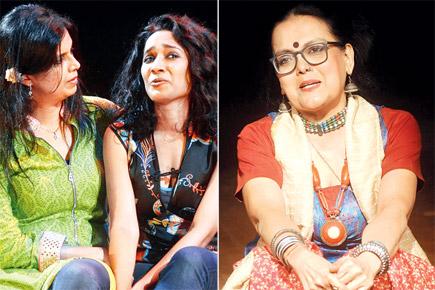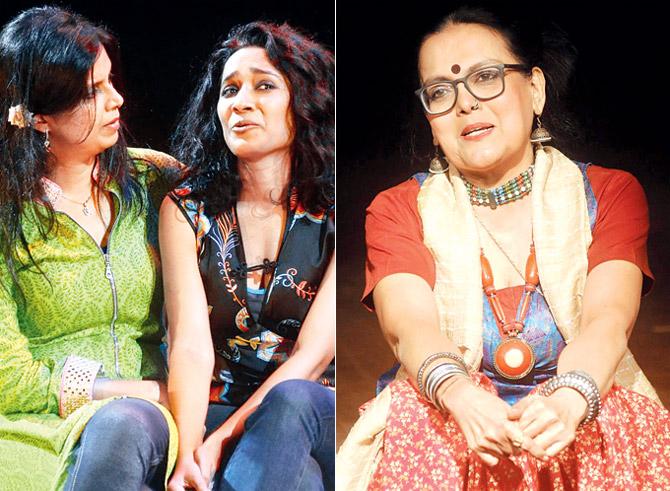The age-old concept that women can only be happy after marriage is now changing with more free-spirited women taking centrestage

Artistes from Facial, Pedicures and Mind Masala; (right) Sushmita Mukherjee in Naribai in NCPA Centrestage 2016. Pics/Narendra Dangiya
 Mrs Sharma has a business card stating that she is "Homemaker to Mr Sharma." No first name; it is as if she has obliterated her own identity to become Mrs Sharma. In the play, Facial, Pedicures And Mind Masala, the homemaker is played by Divya Jagdale who visits a beauty parlour to get her upper lip waxed, because that's the way her husband likes it. What she likes, he doesn't seem to care about.
Mrs Sharma has a business card stating that she is "Homemaker to Mr Sharma." No first name; it is as if she has obliterated her own identity to become Mrs Sharma. In the play, Facial, Pedicures And Mind Masala, the homemaker is played by Divya Jagdale who visits a beauty parlour to get her upper lip waxed, because that's the way her husband likes it. What she likes, he doesn't seem to care about.

Artistes from Facial, Pedicures and Mind Masala; (right) Sushmita Mukherjee in Naribai in NCPA Centrestage 2016. Pics/Narendra Dangiya
ADVERTISEMENT
Mrs Sharma encounters Tia ("call me T" — Tannishtha Chatterjee) at the parlour, who is beautifying herself because she wants to, not because she has to please a man. The meeting results in an unlikely friendship between the two women. Even though the characters are painted in broad strokes (the play was developed by the two actresses, and the ease of the creative interaction is evident), there is a lot that is relatable about the lives of Mrs Sharma and Ms T.
The big shift, however, is that a few years ago, the single woman would have been the object of pity, and the housewife smug in her comfortable marriage with a rich husband and son. Now the audience sees a nervous, jittery, clearly unhappy woman, whose life revolves around her husband. Tia lives as she pleases, and dumps an otherwise suitable boyfriend because he snores. Mrs Sharma finds this shocking, since her brief, unsatisfactory sexual encounters with her husband end with him snoring and passing wind, without a thought to her needs or feelings.
With Tia, the homemaker sheds some of her inhibitions — their stripping to swimwear on the beach is strangely liberating for Mrs Sharma, while Tia is quite comfortable in her skin. Mrs Sharma may seem like a throwback, but there are millions of women trapped in unfulfilling marriages because there is no way out; or they don't want to
escape, because the alternative is too scary to contemplate. Which is not to say that single women have a perfect life, but at least in this play, Tia is less lonely and more emotionally sorted than Mrs Sharma, even though in the eyes of society it is the latter who has it all.
In Naribai, the one-woman play written, directed and enacted by Sushmita Mukherjee, Sunaina is an upper class homemaker, who has reached the age of redundancy. Her husband has his career to keep him busy and possibly an extra-marital affair or two; her children are grown up with lives of their own, and no time to even talk to her with civility. The home is managed well by the domestic help. Nobody really needs Sunaina.
Sushmita Mukherjee playing herself, recalls her childhood friend Sunaina, the rich, privileged one, who came to school in a car. The middle-class Sushmita remembers the charmed life Sunaina led, with lavish birthday parties and a fridge full of a coveted fizzy drinks. She is surprised when she is chosen to play the lead in the school play instead of beautiful Sunaina. The friendship does not last and the two reconnect many years later, when Sunaina has had her existence turned inside out by a firecracker of a woman called Naribai.
Sunaina, a blogger and hobby writer, is given an assignment to do a book on an award-winning folk performer called Naribai. The woman belongs to the Bedhni tribe of Bundelkhand, where women are sold into prostitution, while also performing the risqué but energetic 'Rai' form of song and dance with travelling Nautankis. Nari, named Rani by her optimistic mother, has her name misspelt by a careless clerk and is stuck with it.
Like the other women of her tribe, she is auctioned to the highest bidder and pushed into prostitution, but it is her talent that saves her. She gives birth to two children by men who became her patrons and raises them single-handedly. Her poverty or lack of education does not strip Naribai of her strength. She may be dependent on men for some financial stability or a dubious kind of respectability, but she makes her own choices. When her son tries to cheat her of her property, she drags him to court.
Society may look down on Naribai, but she conducts herself like a queen, insisting, that her tea be made just so, and that people around her respect her. She prevents her daughter from being forced into sex work and in Mumbai, she becomes a dance teacher to bar girls and film chorus dancers who want to learn her art. It may seem as if fate gave Naribai a dud deal, but she still turned it into a winning hand. While Sunaina fritters away the advantages given to her, she comes to realise that it is Naribai who is truly free and happy. Is the single, free-spirited woman slowly taking the place of the princess in the happily-ever-after fairy tale?
Deepa Gahlot is an award-winning film and theatre critic and an arts administrator. She tweets @deepagahlotSend your feedback to mailbag@mid-day.com
 Subscribe today by clicking the link and stay updated with the latest news!" Click here!
Subscribe today by clicking the link and stay updated with the latest news!" Click here!







